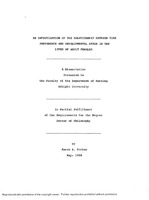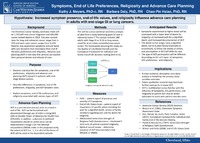An investigation of the relationship between time preference and developmental stage in the lives of adult females
View File(s)
- Author(s)
- Details
-
Karen E. Forbes, PhD, RN, CDE, FNP-BC, BC-ADM
- Sigma Affiliation
- Delta Pi
Visitor Statistics
Visits vs Downloads
Visitors - World Map
Top Visiting Countries
| Country | Visits |
|---|
Top Visiting Cities
| City | Visits |
|---|
Visits (last 6 months)
Downloads (last 6 months)
Popular Works for Forbes, Karen E. by View
| Title | Page Views |
|---|
Popular Works for Forbes, Karen E. by Download
| Title | Downloads |
|---|
View Citations
Citations
Research has been conducted documenting the occurrence of biological rhythms in all aspects of life. Researchers have shown that an individual's time preference for morningness or eveningness parallels some biological rhythms. Others have shown that biological rhythms are stable across the life span. Preliminary studies have been conducted on adult developmental stages. These studies have shown that adults, like children, travel through distinct stages. This study arose when many women reported being an evening type when they were young adults, but changed to being a morning type when they had children. This study was designed to investigate whether a woman's time preference is dependent upon adult developmental stage and therefore a means to adapt to their changing responsibilities. This study recruited 200 women, between the ages of 40 to 60 years. All subjects bore primary child rearing responsibilities for at least one child. Subjects completed A Self-Assessment Questionnaire To Determine Morningness-Eveningness In Human Circadian Rhythms for three periods in their lives; when they had finished school but did not have children, when they had pre-school children, and the present. For each time period, subjects completed the questionnaire to document their time preference. It was hypothesized that an individual's time preference is not an inherent biological rhythm, but rather is an aspect of their developmental stage. It was specifically hypothesized that subjects would be most morning while raising pre-school children. This hypothesis was not fully supported. Questionnaire scores for the morning type sub-sample were linear at all time points. This indicates that for this sub-sample, adult developmental stage did not influence time preference. For all other subjects there was a significant increase in scores (more morningness) from the prechildren to children questionnaire. This data partially supports the original hypothesis, indicating that adult development does influence time preference. The second hypothesis stated that evening types would show greater variance in questionnaire scores than the morning types. This hypothesis was supported. Nurses and other health professionals can use this information to further explore the relationship between time preference and the effectiveness of time adjusted therapeutic regimens.
This dissertation has also been disseminated through the ProQuest Dissertations and Theses database. Dissertation/thesis number: 8816829; ProQuest document ID: 303675219. The author still retains copyright. In all cases, this material is the best available copy, however there may be indistinct, broken or small print on several pages.
This item has not gone through this repository's peer-review process, but has been accepted by the indicated university or college in partial fulfillment of the requirements for the specified degree.
| Type | DNP Capstone Project |
| Acquisition | Proxy-submission |
| Review Type | None: Degree-based Submission |
| Format | Text-based Document |
| Evidence Level | Other |
| Research Approach | Quantitative Research |
| Keywords | Biological Rhythms; Developmental Life Stages; Women's Life Stages |
| CINAHL Subject(s) | Human Development; Women; Time; Circadian Rhythm |
| Grantor | Adelphi University |
| Advisor | Woog, Pierre |
| Level | DNP |
| Year | 1988 |
All rights reserved by the author(s) and/or publisher(s) listed in this item record unless relinquished in whole or part by a rights notation or a Creative Commons License present in this item record.
All permission requests should be directed accordingly and not to the Sigma Repository.
All submitting authors or publishers have affirmed that when using material in their work where they do not own copyright, they have obtained permission of the copyright holder prior to submission and the rights holder has been acknowledged as necessary.
Related items
Showing items related by title, author, creator and subjects.
-
Symptoms, end-of-life preferences, and religiosity in adults with end-stage cancer
Meyers, Kathy J.; Daly, Barbara J.End stage cancers are devastating, with symptoms that lead to treatments that may not be aligned with the patient's preferences, values and religious underpinnings. This study will inform the reader of the concepts of ... -
Investigation into the relationship between critical thinking skills and clinical judgment in the nurse practitioner student
Gorton, Karen L. (2018-03-23)The purpose of this study was to determine if there was a relationship between critical thinking (CT) skills and clinical judgment in nurse practitioner (NP) students enrolled in an advanced practice educational program. ... -
The relationship between executive dysfunction and instrumental activities of daily living in early-stage dementia
Fukuta, Daisuke; Mori, Chizuru (2014-11-17)Session presented on Sunday, July 27, 2014: Purpose: One of the key clinical features of early symptoms of dementia is the cognitive deficits in everyday activities. Until a few years ago, it was considered that early-stage ... -
An investigation of the relationship between the magnitude of life stress, appraisal of adjustment to life stress and the occurrence of conception among women of childbearing age
Roncoli, Marianne T.The purpose of this investigation was to explore the relationship between life stress and conception. Previously, it had been reported that women who were pregnant sustained life stress equal to or greater than people who ... -
The relationship between the stage of moral development and the frequency of dishonest behaviors in the classroom and clinical setting in baccalaureate nursing students
Cooper, Diann C.Nursing is consistently ranked for its honesty and integrity. It is guided by a set of standards for ethical practice. However, nursing students participate in academic dishonesty at rates similar to non-nursing students. ...





